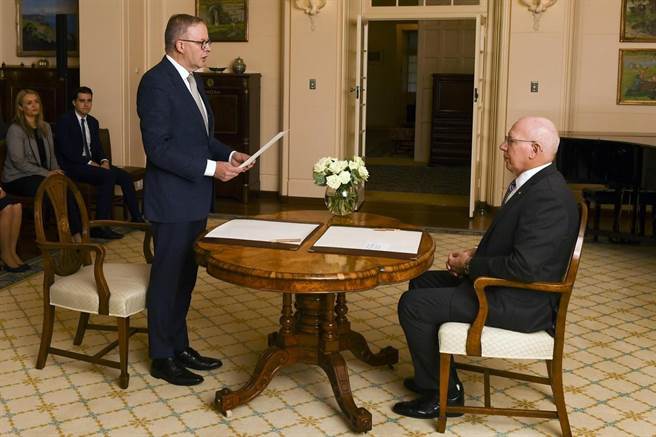時論廣場》蔡政府對澳洲大選結果失望(方恩格)

澳洲工黨領袖艾班尼斯(Anthony Albanese)23日上午宣示就職澳洲第31任總理。(圖片來源:美聯社)
5月21日,澳洲舉行了聯邦選舉,選出了所有151名衆議院議員和76名參議院議員中的40名。自由國家聯盟(保守派或中右翼)未能連續第4次贏得選舉,工黨(中左翼)領袖艾班尼斯取代自由黨領袖莫里森擔任總理。
作爲西方主要民主國家之一、臺灣的重要貿易伙伴,以及在亞洲地區安全中扮演越來越重要的角色,澳洲的選舉結果將對臺灣產生多方面的影響。由於「中國因素」,亞洲、歐洲和美國的許多其他國家都非常關注這次選舉。
就像去年9月加拿大的大選結果,以總理杜魯道爲首的在任自由黨(中左翼政黨)再次贏得足夠的席位,但只能組成少數政府。那些支持莫里森反中政策(與川普政府的政策一致)者的失望是可以理解的,他們也對新任總理艾班尼斯領導下的澳洲對華政策感到憂心。
加拿大大選後,筆者爲《中國時報》撰文評論臺灣政府如何在加拿大大選前採取多項公開行動,表明對加拿大保守黨的支持。換句話說,臺灣曾押寶加拿大的保守黨會贏得選舉。儘管執政的民進黨和加拿大保守黨在社會問題、氣候變化或新冠防疫政策上幾乎沒有共同之處,但臺灣政府希望保守黨贏得加拿大大選完全是基於中國問題。在這方面,臺灣對加拿大的策略與對美國的策略類似,臺灣政府與民進黨對美國的戰略已經接近保守的共和黨,儘管除了在中國問題外幾乎沒有共同點。
毫不奇怪,對澳洲,臺灣也採取了類似的策略。儘管民進黨和自由國家聯盟在除中國以外的大多數問題上存在顯著分歧,但臺灣的行動表明了對保守的自由國家聯盟贏得選舉的偏好。
2017年,臺灣與澳洲自由國家聯合政府簽署秘密協議,爲在諾魯被拘留的尋求庇護者提供醫療服務,以防止這些被拘留者在澳洲尋求醫療服務。儘管這一安排的許多細節仍不得而知,但媒體和非政府組織對臺灣參與的批評很多,也不清楚臺灣得到了什麼回報。
2020年,自由國家聯盟的前總理騰博通過視訊會議在「玉山論壇」上發表演說,2021年,自由國家聯盟前總理艾伯特訪問臺北,在「玉山論壇」上公開演說。儘管他們的露面細節沒有像美國前國務卿蓬佩奧那樣向媒體泄露,但騰博和艾伯特支持臺灣的言論與他們擔任總理時的言行大相逕庭。
同樣在2021年,儘管民進黨政府反對在臺灣使用核電,但臺灣政府仍肯定美英澳三方安全夥伴(AUKUS)協議讓澳大利亞購買核動力潛艇。
選舉當天,臺灣外交部發推特恭喜艾班尼斯,但在同一個推特感謝莫里森。這樣有點失禮,也明顯表示臺灣政府很失望。 應該分開表達,一個恭喜艾班尼斯, 另外發一個感謝莫里森。
澳洲新政府是否會尋求與臺灣更緊密的關係,或者臺灣政府對自由國家聯盟的熱情是否會影響雙邊關係的發展,還有待觀察。有幾個潛在的行動需要注意。
時任國防部長杜登在2021年表示,如果臺海發生戰爭,「若美國出兵保衛臺灣,而澳洲卻不加入軍事行動,將是不可思議的事」。當時的影子外交部長黃英賢立即批評杜登背離了美國「戰略模糊」的政策。即使是拜登總統有時也會脫離「戰略模糊」,澳洲新政府的政策應該引起臺灣的關切。
澳洲是《跨太平洋夥伴全面進步協定》(CPTPP)的成員,但新政府是否會積極倡導臺灣加入CPTPP尚不得而知。
澳洲新政府已承諾任命澳洲首任原住民族無任所大使。一個大膽的舉動是派這位大使參加臺灣的相關活動,例如南島民族論壇。
如果澳洲新政府不積極採取行動支持臺灣,要責備艾班尼斯總理很容易,但臺灣也需要承擔一些責任。(作者爲美國共和黨前亞太區主席)
Taiwan Disappointed by Labor Party Victory in Australia
By Ross Darrell Feingold
Former Asia Chairman Republicans Abroad
Twitter: @RossFeingold
On 21 May 2022 Australia held its federal election to elect all 151 members of the House of Representatives and 40 out of the 76 members of the Senate. The Liberal-National (the conservative, or right of center) coalition failed to win a fourth consecutive election, and Labor Party (left of center) leader Anthony Albanese has replaced Liberal Party leader Scott Morrison as prime minister.
As one of the major western democracies, an important trading partner for Taiwan, and with an increasingly important role in regional security in Asia, Australia’s election result will affect Taiwan in many ways. Due to the “China factor”, many other countries in Asia, Europe, and the United States paid close attention to this election.
Like the results of Canada’s election last September in which the incumbent Liberal Party (Canada’s left-of-center party) led by Prime Minister Justin Trudeau again won a sufficient number of seats to only form a minority government, those who supported Scott Morrison’s robust China policies (which were consistent with the Trump Administration policies) are understandably disappointed and are concerned about Australia’s China policy under new Prime Minister Albanese.
Following Canada’s election, this author wrote a commentary for The China Times that discussed how the Taiwan government had taken several public actions prior to Canada’s election that demonstrated its support for Canada’s Conservative Party. In other words, Taiwan had wagered (押寶, yābǎo) that Canada’s Conservative Party would win the election. Notwithstanding that the ruling Democratic Progressive Party and Canada’s Conservative Party share little in common on social issues, climate change, or COVID-19 policy, the Taiwan government’s hope that the Conservative Party would win Canada’s election was based solely on China issues. In this regard, Taiwan’s strategy in Canada was similar to its strategy in the United States, where the Taiwan government and the Democratic Progressive Party have become close to the conservative Republican Party, despite having little in common other than on China issues.
It is no surprise that in Australia, Taiwan pursued a similar strategy. Taiwan’s actions demonstrated a preference for the conservative Liberal-National coalition to win the election, despite the significant differences between the Democratic Progressive Party and the Liberal-National coalition on most issues other than China.
In 2017, Taiwan signed a secret agreement with Australia’s Liberal-National coalition government to provide medical treatment for asylum seekers detained on Nauru, so as to prevent these detainees from seeking medical care in Australia. Although many details of this arrangement remain unknown, there was much media and non-government organization criticism of Taiwan’s participation, and it is unclear what benefit Taiwan received in return.
In 2020, former Liberal-National prime minister Malcolm Turnbull spoke to the Yushan Forum via videoconference, and in 2021, former Liberal-National prime minister Tony Abbott visited Taipei to speak at the Yushan Forum. Although details of their appearances were not leaked to the media as what happened with former United States Secretary of State Mike Pompeo, both Turnbull and Abbott’s comments in support of Taiwan differed significantly from what they said or did as prime minister.
Also in 2021, the Taiwan government expressed its enthusiasm for the AUKUS agreement under which Australia will acquire nuclear powered submarines, despite the Taiwan government’s opposition to the use of nuclear power in Taiwan.
As if to underscore Taiwan's disappointment that Morrison will no longer be prime minister, Taiwan's Ministry of Foreign Affairs tweeted its congratulations to Albanese, but in the same tweet, thanked Morrison for his support, rather than separately tweet a congratulations to Albanese and a thank you to Morrisoin.
It remains to be seen whether Australia’s new government will seek a closer relationship with Taiwan or if the Taiwan government’s enthusiasm for the Liberal-National coalition will affect bilateral relations going forward. There are several potential actions to watch for.
When then-Defence Minister Peter Dutton said in 2021 “It would be inconceivable that we wouldn’t support the US in an action if the US chose to take that action” if there is a war in the Taiwan Strait, then-shadow foreign minister Penny Wong quickly criticized Dutton for departing from the US policy of “strategic ambiguity”. With even President Biden sometimes departing from “strategic ambiguity”, the new Australian government’s policy should be a concern for Taiwan.
Australia is a member of the Comprehensive and Progressive Agreement for Trans-Pacific Partnership, but it is unknown whether the new government will enthusiastically advocate for Taiwan’s CPTPP membership.
The new Australian government has committed to appointing Australia’s inaugural First Nations Ambassador. A bold action would be to send this ambassador to attend relevant events in Taiwan such as the Austronesian Forum.
If the new Australian government fails to take enthusiastic action to support Taiwan, it will be easy to blame Prime Minister Albanese, though some blame will also need to be borne by Taiwan.
※以上言論不代表旺中媒體集團立場※

















